Ethical Leadership: Navigating Global Business Ethics and Standards
VerifiedAdded on 2020/04/13
|6
|1496
|41
Essay
AI Summary
This essay examines the evolving landscape of global business, contrasting ethical standards in developed and developing nations. It critically assesses the challenges of establishing ethical standards to combat corruption and promote corporate social responsibility, particularly in emerging markets. The essay explores the complexities of conflicting ethical standards across borders, considering whose standards should prevail and advocating for a nuanced approach that respects both host and guest country ethics. The author, assuming the role of a leader, outlines a framework for maintaining personal and organizational standards of ethical business practice, emphasizing the importance of core values, workplace culture, and adapting strategies to different market contexts, including motivation, reward systems, and identifying growth opportunities.
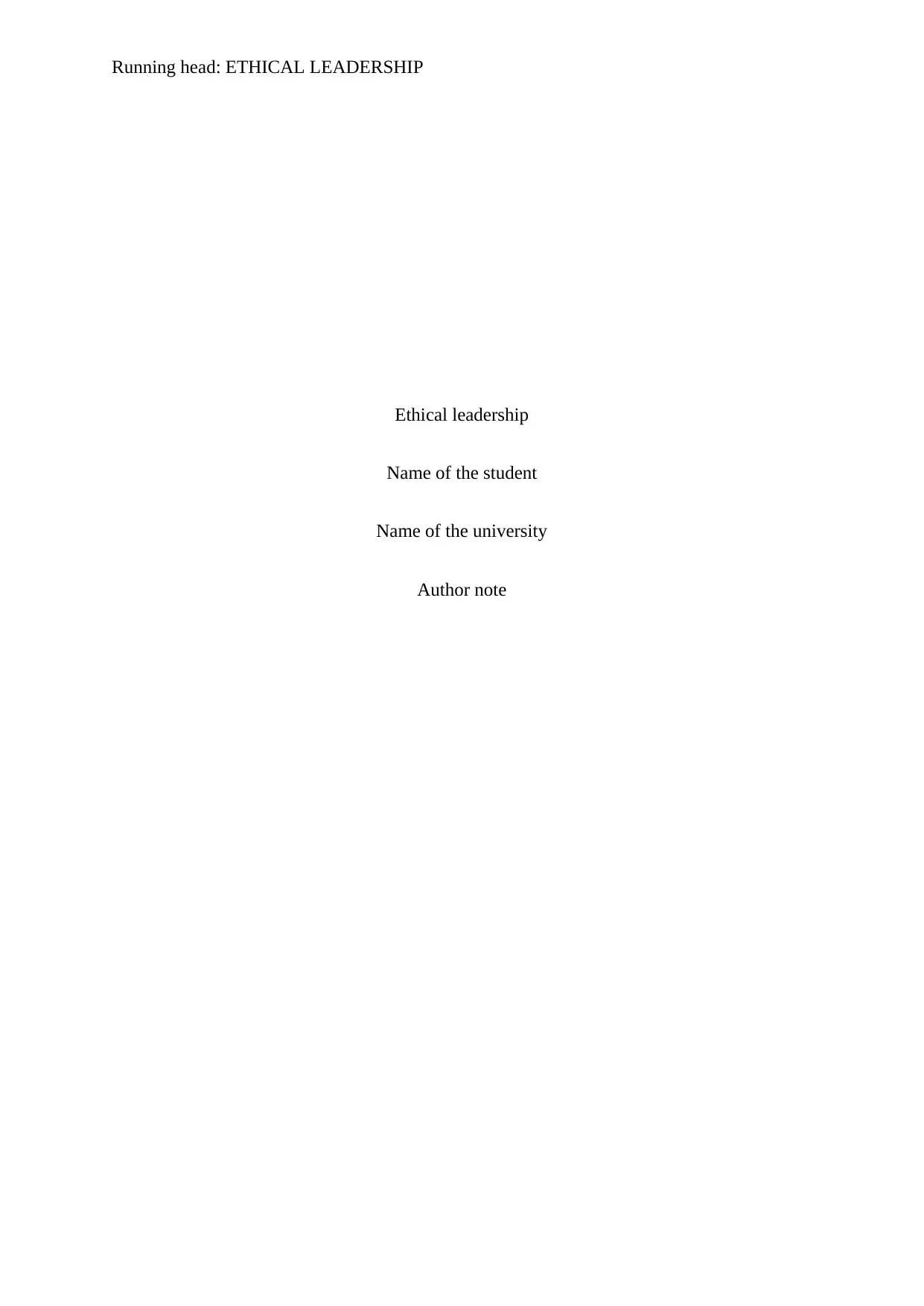
Running head: ETHICAL LEADERSHIP
Ethical leadership
Name of the student
Name of the university
Author note
Ethical leadership
Name of the student
Name of the university
Author note
Paraphrase This Document
Need a fresh take? Get an instant paraphrase of this document with our AI Paraphraser
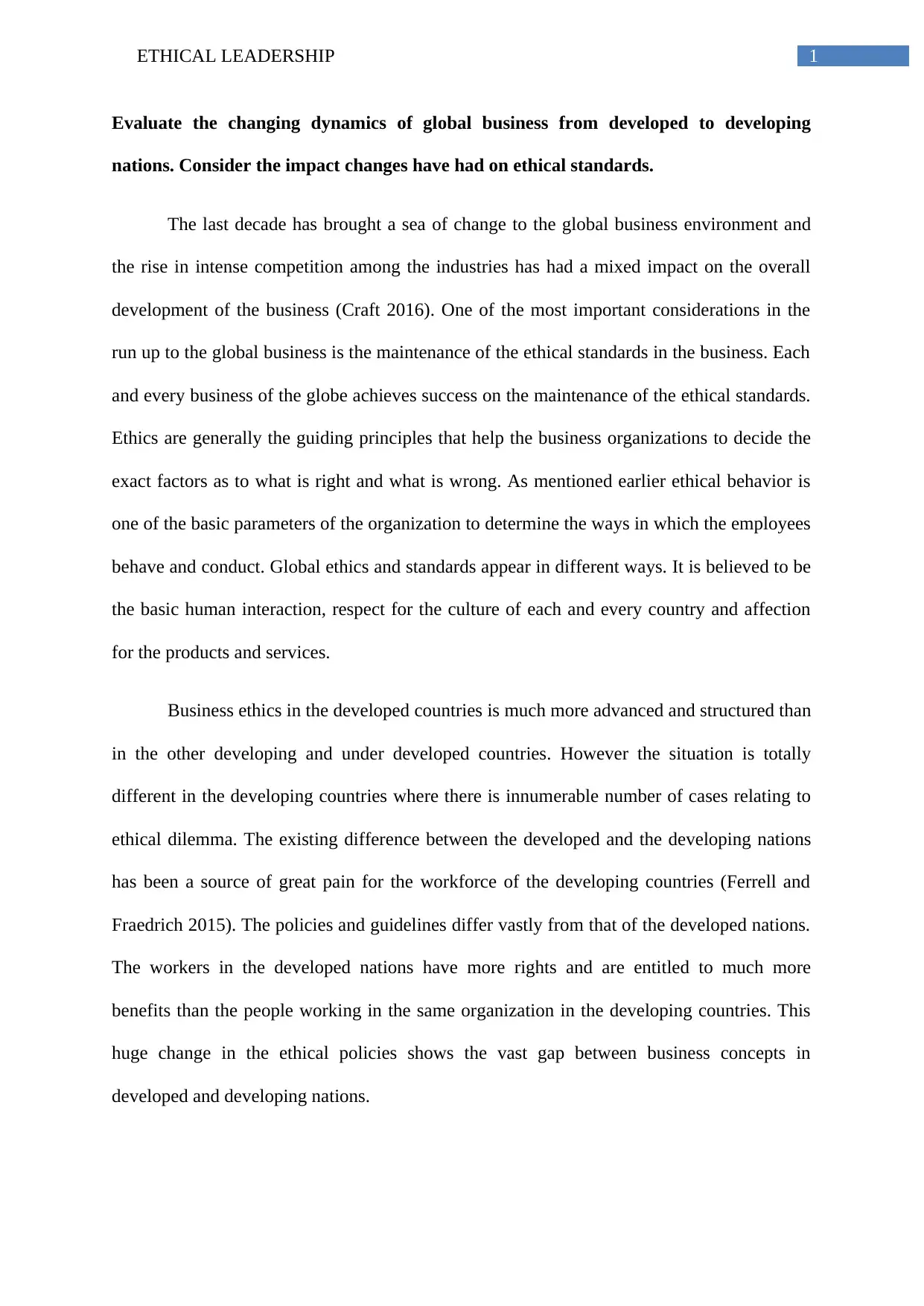
1ETHICAL LEADERSHIP
Evaluate the changing dynamics of global business from developed to developing
nations. Consider the impact changes have had on ethical standards.
The last decade has brought a sea of change to the global business environment and
the rise in intense competition among the industries has had a mixed impact on the overall
development of the business (Craft 2016). One of the most important considerations in the
run up to the global business is the maintenance of the ethical standards in the business. Each
and every business of the globe achieves success on the maintenance of the ethical standards.
Ethics are generally the guiding principles that help the business organizations to decide the
exact factors as to what is right and what is wrong. As mentioned earlier ethical behavior is
one of the basic parameters of the organization to determine the ways in which the employees
behave and conduct. Global ethics and standards appear in different ways. It is believed to be
the basic human interaction, respect for the culture of each and every country and affection
for the products and services.
Business ethics in the developed countries is much more advanced and structured than
in the other developing and under developed countries. However the situation is totally
different in the developing countries where there is innumerable number of cases relating to
ethical dilemma. The existing difference between the developed and the developing nations
has been a source of great pain for the workforce of the developing countries (Ferrell and
Fraedrich 2015). The policies and guidelines differ vastly from that of the developed nations.
The workers in the developed nations have more rights and are entitled to much more
benefits than the people working in the same organization in the developing countries. This
huge change in the ethical policies shows the vast gap between business concepts in
developed and developing nations.
Evaluate the changing dynamics of global business from developed to developing
nations. Consider the impact changes have had on ethical standards.
The last decade has brought a sea of change to the global business environment and
the rise in intense competition among the industries has had a mixed impact on the overall
development of the business (Craft 2016). One of the most important considerations in the
run up to the global business is the maintenance of the ethical standards in the business. Each
and every business of the globe achieves success on the maintenance of the ethical standards.
Ethics are generally the guiding principles that help the business organizations to decide the
exact factors as to what is right and what is wrong. As mentioned earlier ethical behavior is
one of the basic parameters of the organization to determine the ways in which the employees
behave and conduct. Global ethics and standards appear in different ways. It is believed to be
the basic human interaction, respect for the culture of each and every country and affection
for the products and services.
Business ethics in the developed countries is much more advanced and structured than
in the other developing and under developed countries. However the situation is totally
different in the developing countries where there is innumerable number of cases relating to
ethical dilemma. The existing difference between the developed and the developing nations
has been a source of great pain for the workforce of the developing countries (Ferrell and
Fraedrich 2015). The policies and guidelines differ vastly from that of the developed nations.
The workers in the developed nations have more rights and are entitled to much more
benefits than the people working in the same organization in the developing countries. This
huge change in the ethical policies shows the vast gap between business concepts in
developed and developing nations.
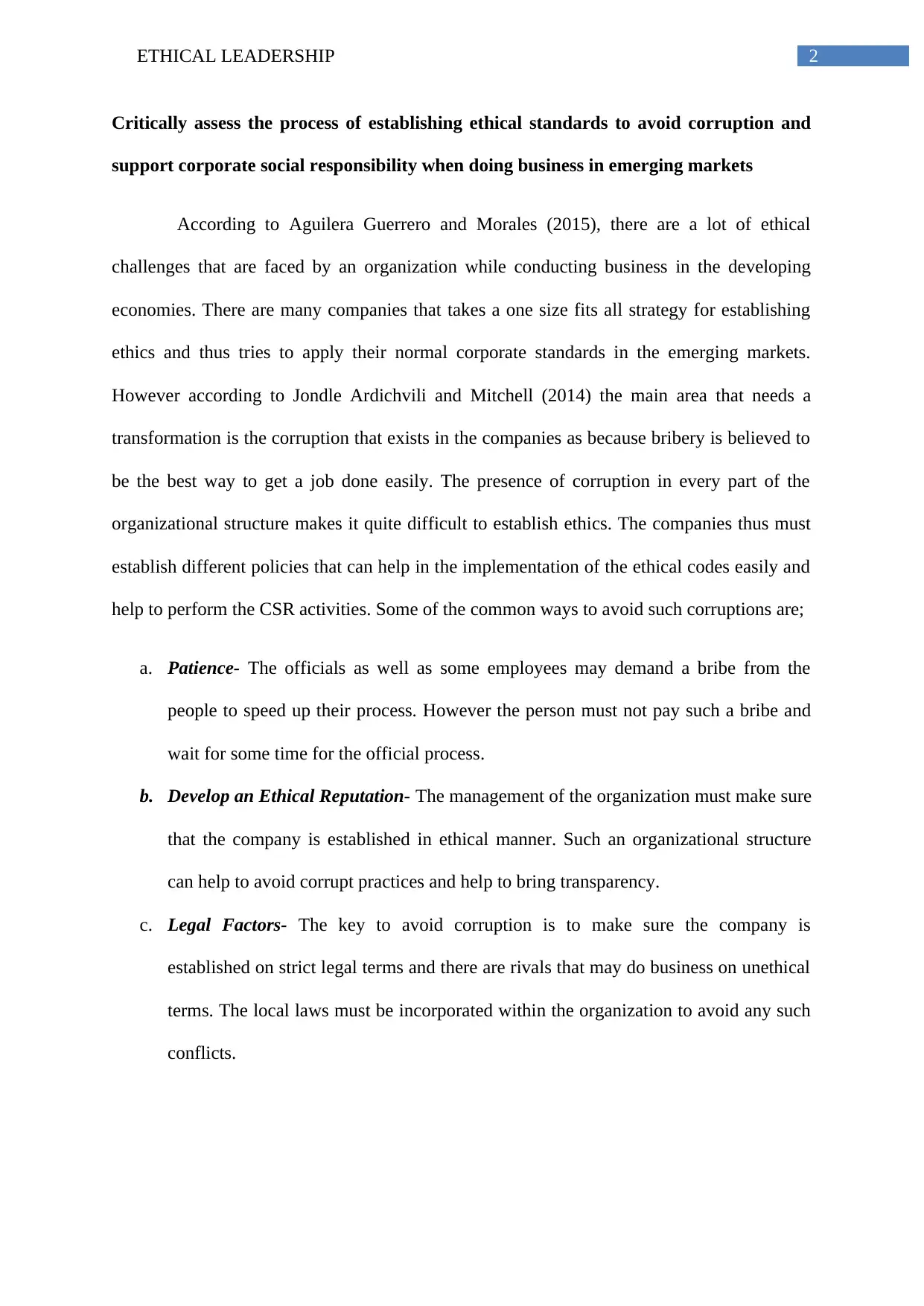
2ETHICAL LEADERSHIP
Critically assess the process of establishing ethical standards to avoid corruption and
support corporate social responsibility when doing business in emerging markets
According to Aguilera Guerrero and Morales (2015), there are a lot of ethical
challenges that are faced by an organization while conducting business in the developing
economies. There are many companies that takes a one size fits all strategy for establishing
ethics and thus tries to apply their normal corporate standards in the emerging markets.
However according to Jondle Ardichvili and Mitchell (2014) the main area that needs a
transformation is the corruption that exists in the companies as because bribery is believed to
be the best way to get a job done easily. The presence of corruption in every part of the
organizational structure makes it quite difficult to establish ethics. The companies thus must
establish different policies that can help in the implementation of the ethical codes easily and
help to perform the CSR activities. Some of the common ways to avoid such corruptions are;
a. Patience- The officials as well as some employees may demand a bribe from the
people to speed up their process. However the person must not pay such a bribe and
wait for some time for the official process.
b. Develop an Ethical Reputation- The management of the organization must make sure
that the company is established in ethical manner. Such an organizational structure
can help to avoid corrupt practices and help to bring transparency.
c. Legal Factors- The key to avoid corruption is to make sure the company is
established on strict legal terms and there are rivals that may do business on unethical
terms. The local laws must be incorporated within the organization to avoid any such
conflicts.
Critically assess the process of establishing ethical standards to avoid corruption and
support corporate social responsibility when doing business in emerging markets
According to Aguilera Guerrero and Morales (2015), there are a lot of ethical
challenges that are faced by an organization while conducting business in the developing
economies. There are many companies that takes a one size fits all strategy for establishing
ethics and thus tries to apply their normal corporate standards in the emerging markets.
However according to Jondle Ardichvili and Mitchell (2014) the main area that needs a
transformation is the corruption that exists in the companies as because bribery is believed to
be the best way to get a job done easily. The presence of corruption in every part of the
organizational structure makes it quite difficult to establish ethics. The companies thus must
establish different policies that can help in the implementation of the ethical codes easily and
help to perform the CSR activities. Some of the common ways to avoid such corruptions are;
a. Patience- The officials as well as some employees may demand a bribe from the
people to speed up their process. However the person must not pay such a bribe and
wait for some time for the official process.
b. Develop an Ethical Reputation- The management of the organization must make sure
that the company is established in ethical manner. Such an organizational structure
can help to avoid corrupt practices and help to bring transparency.
c. Legal Factors- The key to avoid corruption is to make sure the company is
established on strict legal terms and there are rivals that may do business on unethical
terms. The local laws must be incorporated within the organization to avoid any such
conflicts.
⊘ This is a preview!⊘
Do you want full access?
Subscribe today to unlock all pages.

Trusted by 1+ million students worldwide
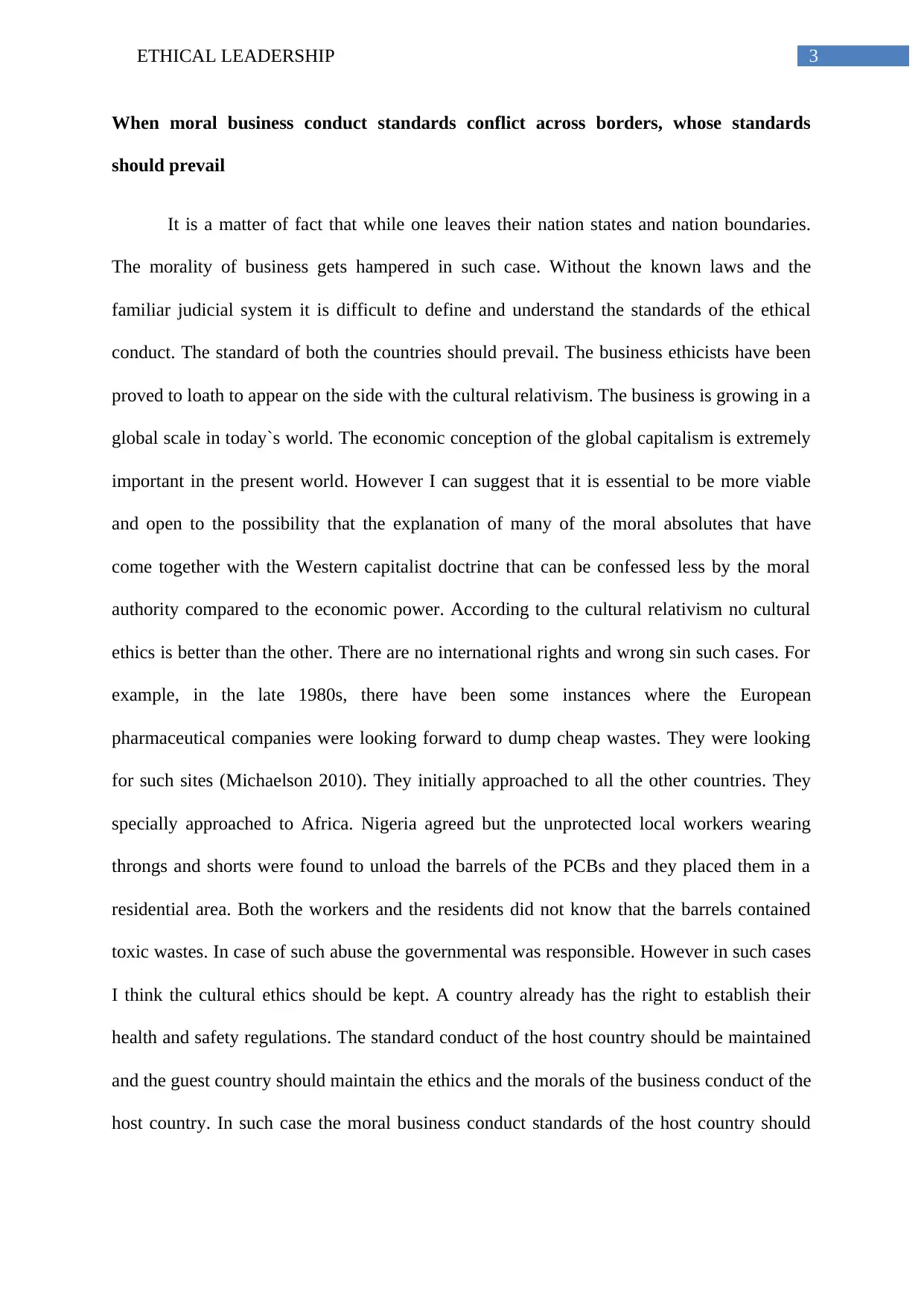
3ETHICAL LEADERSHIP
When moral business conduct standards conflict across borders, whose standards
should prevail
It is a matter of fact that while one leaves their nation states and nation boundaries.
The morality of business gets hampered in such case. Without the known laws and the
familiar judicial system it is difficult to define and understand the standards of the ethical
conduct. The standard of both the countries should prevail. The business ethicists have been
proved to loath to appear on the side with the cultural relativism. The business is growing in a
global scale in today`s world. The economic conception of the global capitalism is extremely
important in the present world. However I can suggest that it is essential to be more viable
and open to the possibility that the explanation of many of the moral absolutes that have
come together with the Western capitalist doctrine that can be confessed less by the moral
authority compared to the economic power. According to the cultural relativism no cultural
ethics is better than the other. There are no international rights and wrong sin such cases. For
example, in the late 1980s, there have been some instances where the European
pharmaceutical companies were looking forward to dump cheap wastes. They were looking
for such sites (Michaelson 2010). They initially approached to all the other countries. They
specially approached to Africa. Nigeria agreed but the unprotected local workers wearing
throngs and shorts were found to unload the barrels of the PCBs and they placed them in a
residential area. Both the workers and the residents did not know that the barrels contained
toxic wastes. In case of such abuse the governmental was responsible. However in such cases
I think the cultural ethics should be kept. A country already has the right to establish their
health and safety regulations. The standard conduct of the host country should be maintained
and the guest country should maintain the ethics and the morals of the business conduct of the
host country. In such case the moral business conduct standards of the host country should
When moral business conduct standards conflict across borders, whose standards
should prevail
It is a matter of fact that while one leaves their nation states and nation boundaries.
The morality of business gets hampered in such case. Without the known laws and the
familiar judicial system it is difficult to define and understand the standards of the ethical
conduct. The standard of both the countries should prevail. The business ethicists have been
proved to loath to appear on the side with the cultural relativism. The business is growing in a
global scale in today`s world. The economic conception of the global capitalism is extremely
important in the present world. However I can suggest that it is essential to be more viable
and open to the possibility that the explanation of many of the moral absolutes that have
come together with the Western capitalist doctrine that can be confessed less by the moral
authority compared to the economic power. According to the cultural relativism no cultural
ethics is better than the other. There are no international rights and wrong sin such cases. For
example, in the late 1980s, there have been some instances where the European
pharmaceutical companies were looking forward to dump cheap wastes. They were looking
for such sites (Michaelson 2010). They initially approached to all the other countries. They
specially approached to Africa. Nigeria agreed but the unprotected local workers wearing
throngs and shorts were found to unload the barrels of the PCBs and they placed them in a
residential area. Both the workers and the residents did not know that the barrels contained
toxic wastes. In case of such abuse the governmental was responsible. However in such cases
I think the cultural ethics should be kept. A country already has the right to establish their
health and safety regulations. The standard conduct of the host country should be maintained
and the guest country should maintain the ethics and the morals of the business conduct of the
host country. In such case the moral business conduct standards of the host country should
Paraphrase This Document
Need a fresh take? Get an instant paraphrase of this document with our AI Paraphraser
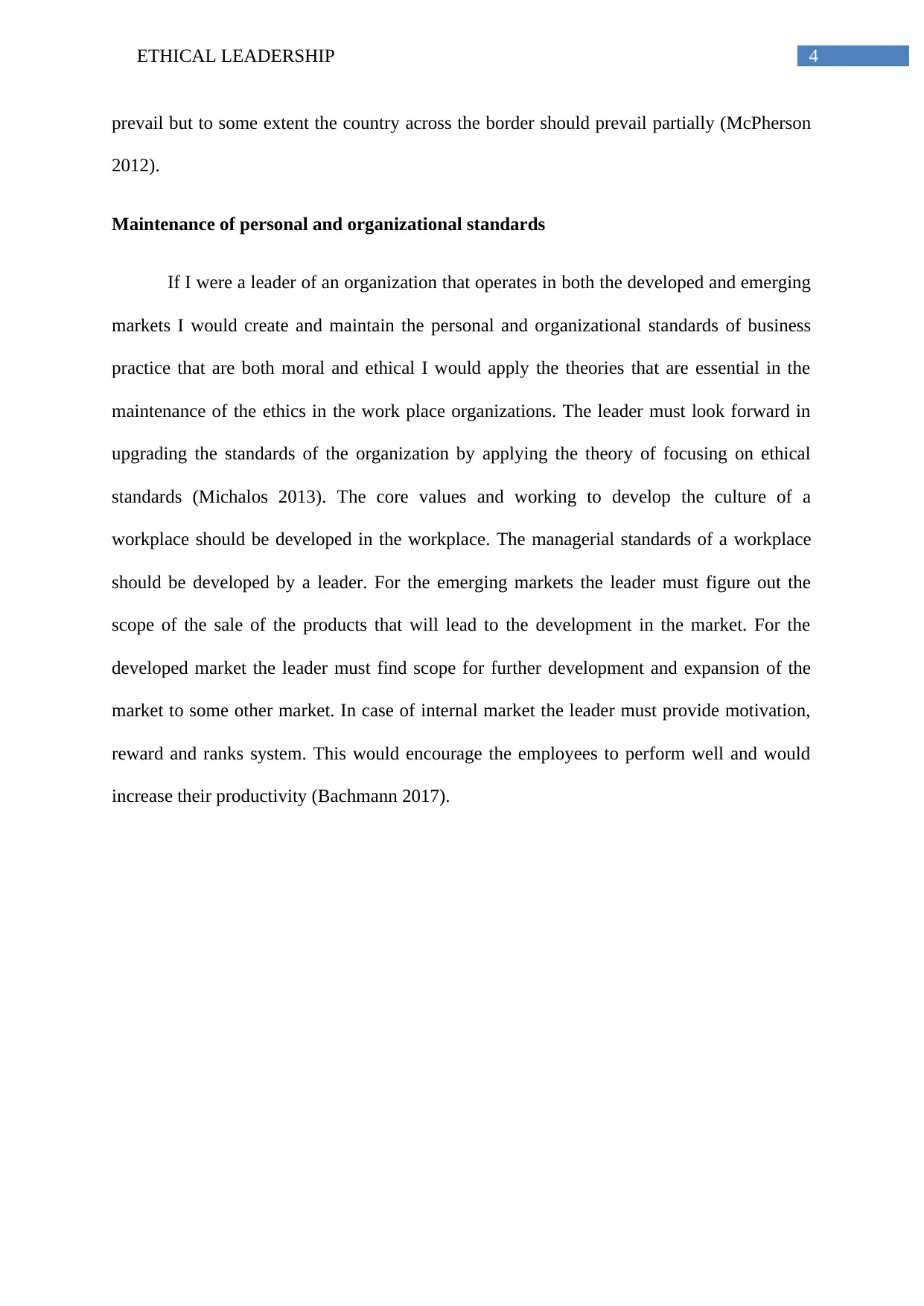
4ETHICAL LEADERSHIP
prevail but to some extent the country across the border should prevail partially (McPherson
2012).
Maintenance of personal and organizational standards
If I were a leader of an organization that operates in both the developed and emerging
markets I would create and maintain the personal and organizational standards of business
practice that are both moral and ethical I would apply the theories that are essential in the
maintenance of the ethics in the work place organizations. The leader must look forward in
upgrading the standards of the organization by applying the theory of focusing on ethical
standards (Michalos 2013). The core values and working to develop the culture of a
workplace should be developed in the workplace. The managerial standards of a workplace
should be developed by a leader. For the emerging markets the leader must figure out the
scope of the sale of the products that will lead to the development in the market. For the
developed market the leader must find scope for further development and expansion of the
market to some other market. In case of internal market the leader must provide motivation,
reward and ranks system. This would encourage the employees to perform well and would
increase their productivity (Bachmann 2017).
prevail but to some extent the country across the border should prevail partially (McPherson
2012).
Maintenance of personal and organizational standards
If I were a leader of an organization that operates in both the developed and emerging
markets I would create and maintain the personal and organizational standards of business
practice that are both moral and ethical I would apply the theories that are essential in the
maintenance of the ethics in the work place organizations. The leader must look forward in
upgrading the standards of the organization by applying the theory of focusing on ethical
standards (Michalos 2013). The core values and working to develop the culture of a
workplace should be developed in the workplace. The managerial standards of a workplace
should be developed by a leader. For the emerging markets the leader must figure out the
scope of the sale of the products that will lead to the development in the market. For the
developed market the leader must find scope for further development and expansion of the
market to some other market. In case of internal market the leader must provide motivation,
reward and ranks system. This would encourage the employees to perform well and would
increase their productivity (Bachmann 2017).
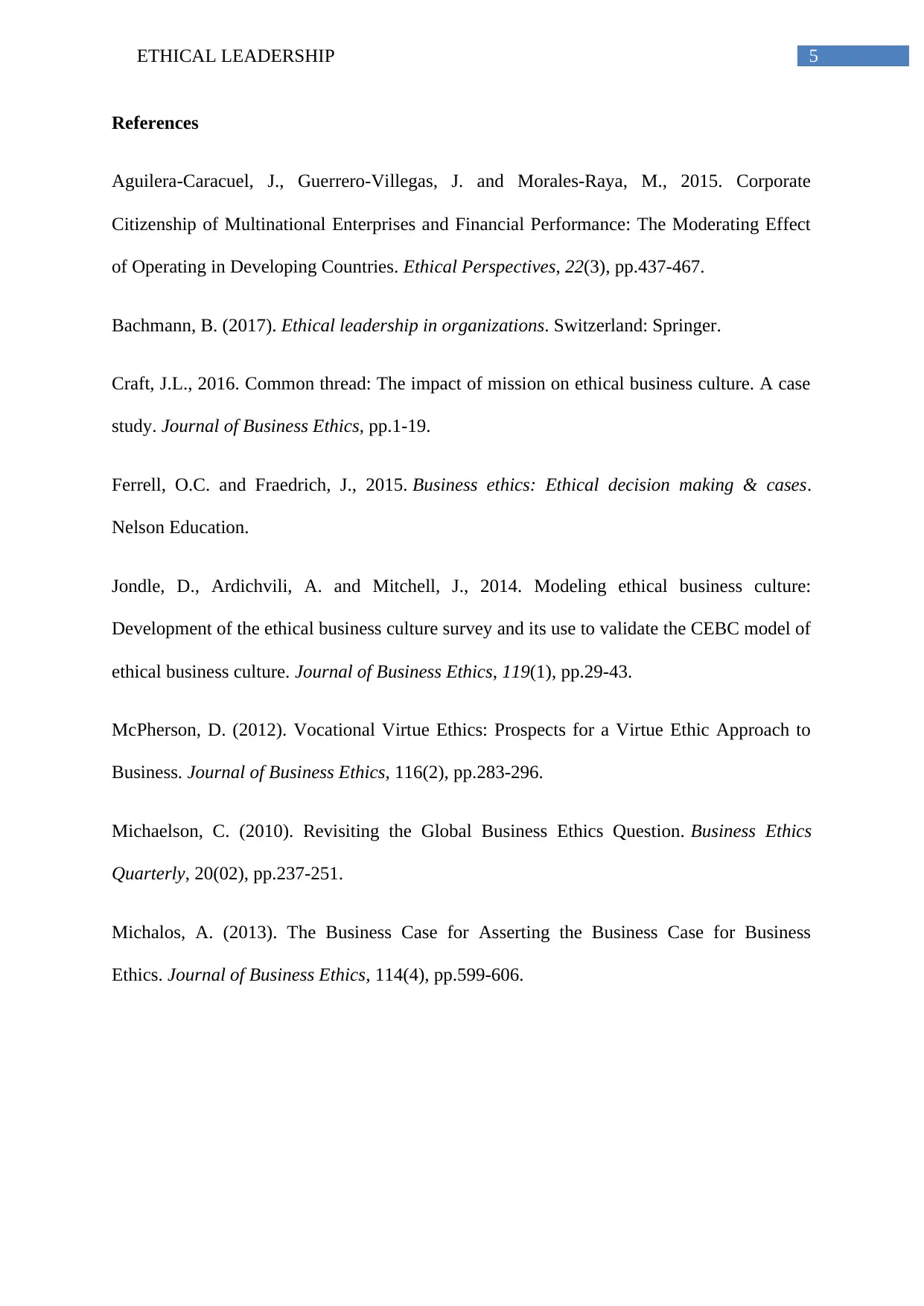
5ETHICAL LEADERSHIP
References
Aguilera-Caracuel, J., Guerrero-Villegas, J. and Morales-Raya, M., 2015. Corporate
Citizenship of Multinational Enterprises and Financial Performance: The Moderating Effect
of Operating in Developing Countries. Ethical Perspectives, 22(3), pp.437-467.
Bachmann, B. (2017). Ethical leadership in organizations. Switzerland: Springer.
Craft, J.L., 2016. Common thread: The impact of mission on ethical business culture. A case
study. Journal of Business Ethics, pp.1-19.
Ferrell, O.C. and Fraedrich, J., 2015. Business ethics: Ethical decision making & cases.
Nelson Education.
Jondle, D., Ardichvili, A. and Mitchell, J., 2014. Modeling ethical business culture:
Development of the ethical business culture survey and its use to validate the CEBC model of
ethical business culture. Journal of Business Ethics, 119(1), pp.29-43.
McPherson, D. (2012). Vocational Virtue Ethics: Prospects for a Virtue Ethic Approach to
Business. Journal of Business Ethics, 116(2), pp.283-296.
Michaelson, C. (2010). Revisiting the Global Business Ethics Question. Business Ethics
Quarterly, 20(02), pp.237-251.
Michalos, A. (2013). The Business Case for Asserting the Business Case for Business
Ethics. Journal of Business Ethics, 114(4), pp.599-606.
References
Aguilera-Caracuel, J., Guerrero-Villegas, J. and Morales-Raya, M., 2015. Corporate
Citizenship of Multinational Enterprises and Financial Performance: The Moderating Effect
of Operating in Developing Countries. Ethical Perspectives, 22(3), pp.437-467.
Bachmann, B. (2017). Ethical leadership in organizations. Switzerland: Springer.
Craft, J.L., 2016. Common thread: The impact of mission on ethical business culture. A case
study. Journal of Business Ethics, pp.1-19.
Ferrell, O.C. and Fraedrich, J., 2015. Business ethics: Ethical decision making & cases.
Nelson Education.
Jondle, D., Ardichvili, A. and Mitchell, J., 2014. Modeling ethical business culture:
Development of the ethical business culture survey and its use to validate the CEBC model of
ethical business culture. Journal of Business Ethics, 119(1), pp.29-43.
McPherson, D. (2012). Vocational Virtue Ethics: Prospects for a Virtue Ethic Approach to
Business. Journal of Business Ethics, 116(2), pp.283-296.
Michaelson, C. (2010). Revisiting the Global Business Ethics Question. Business Ethics
Quarterly, 20(02), pp.237-251.
Michalos, A. (2013). The Business Case for Asserting the Business Case for Business
Ethics. Journal of Business Ethics, 114(4), pp.599-606.
⊘ This is a preview!⊘
Do you want full access?
Subscribe today to unlock all pages.

Trusted by 1+ million students worldwide
1 out of 6
Related Documents
Your All-in-One AI-Powered Toolkit for Academic Success.
+13062052269
info@desklib.com
Available 24*7 on WhatsApp / Email
![[object Object]](/_next/static/media/star-bottom.7253800d.svg)
Unlock your academic potential
Copyright © 2020–2026 A2Z Services. All Rights Reserved. Developed and managed by ZUCOL.



